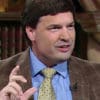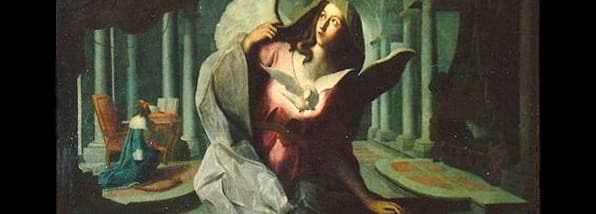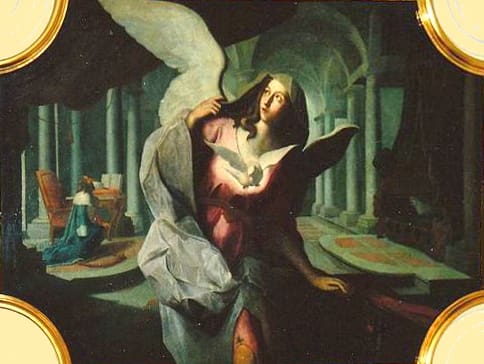Holy Fear
We find in the writings of the great mystics, especially of those who have been recognized as “Doctor of the Church,” a certain unanimous consent concerning the importance of holy fear if we are to grow in our life of prayer. They have a sense that it is a fearful thing to stand vulnerable in the presence of God. They understand that we ought not to presume anything. Fear of the Lord cultivates a certain humility of heart, and this humility is a vital protection for ego-inflation. An exaggerated self-esteem before God is reckoned as a cause for the fall of the angels. The saints are aware that, without the gift of holy fear from the Holy Spirit, anyone is capable of a spiritual haughtiness and arrogance that has no place before the Judgment Seat of God.
Saint Thomas Aquinas identifies a certain holy fear as a gift of the Holy Spirit distinct from any kind of self-centered timidity before the Living God (See Summa Theologica II-II, 19). The Gift of Fear perfects the hope we have in Christ (see art. 9). In this sense, this movement of the Holy Spirit in us gives us the courage to stand before the Lord even as we acknowledge our sinfulness. Those whom the Holy Spirit moves with holy fear do not get bogged down with themselves or what might happen to them, even when fully aware of what they deserve. Instead, this fear gives them the courage to live by perfect love. Without the Holy Spirit moving us away from these treacherous snares, we very easily betray the One who awaits us in love.
The authentic Christian humbly surrenders to the just judgments of Divine Justice in prayer because such a disciple has fear enough not only to acknowledge failures, but also to acknowledge that all of his inadequacies combined cannot separate him from the love of God revealed by Christ Jesus. Every time we pray in faith, we anticipate the ultimate moment of our lives. Whenever we breathe out a prayer, we are already entering into the mystery of our last breath. To pray is to approach the judgment of the Almighty God, the Judge of the living and the dead. We dare to pray with such holy fear not on the basis of our own merits but only because of what Christ has done for us.
Saint John of the Cross insists that we can only be transformed in God through love when our fear of Him is made perfect (see Ascent, 1, 2, 4). Holy fear moves the lover of God to bow in awe before the completely unfamiliar splendor of the Father’s sovereign majesty, and because of this, such a believer has the capacity to be vulnerable to the secret judgments of God, to be pierced by what pierces the Heart of God, even to a deep and mysterious sharing in the passion of Christ (see Ascent 2, 7, 11).
Saint Teresa of Avila advises souls who want to progress in prayer not to allow themselves to find in their spiritual achievements a sense of security before the presence of God (See Interior Castle 3, 1). Even after years of great discipline, she knew by her own experience how the capacity for self-deception lingers on. She does not want her readers to taste the bitter danger of an inflated ego that cannot distinguish its own narcissistic whims from the goodness and wisdom of the holy Will of God. Instead, she invites those who want to mature in their life of prayer to meditate frequently on Psalm 112:1: “Blessed is the man that fears the Lord.”
Saint Hildegard von Bingen, in her Scivias, contemplates Holy Fear as she approaches the very shadow of God’s immensity. She personifies this astonishing super human gift, describing a mysterious figure covered with eyes, a creature who never loses sight of the incomprehensibility of Divine Justice. Holy Fear is present as she enters by contemplation the presence of what is most ultimate, the Reality against which the reality of our lives are judged. Holy Fear stands between her and the towering majesty of God. This image communicates an attitude that is at once humble and vulnerable, fascinated and filled with wonder. She draws nearer to the Lord through this gift not on the basis of her merits, but instead, fully aware of her impurity and inadequacy. Tested, challenged, and tried, this gift from above makes it possible for her to dare to listen to God. The tedium that can sometimes overcome prayer has no power over her now. In her contemplation, she stands with Holy Fear scrutinized by the gaze of heaven, attentive to its voice. Profound reverence prevents her from losing her focus, gives her the courage to stand firm, to accept the truth about herself before the Lord, and cry out to the world about what she sees and hears.
The doctrines of Saint Hildegard, Saint Thomas, Saint Teresa of Avila and Saint John of the Cross paint a striking portrait of the role of Fear of the Lord in prayer. Their witness and teaching see a proper place for this gift and help us understand its importance for our own life of prayer. They are convinced that this mysterious and holy gift from above opens us more completely to the great mystery of human weakness and divine power, and helps us see the glory of His power made perfect in our weakness. In different and complementary ways, they help us understand how only by the invincible hope that His gift of holy fear perfects can prayer learn to rest in the merciful love of the Father.
Frail though we are, the Lord of Heaven and Earth invites us to stand before the immensity of His justice and truth, and humbly ask for mercy with trust and confidence. Here, Holy Fear protects our dignity and prevents us from presuming things that are not worthy of such a tender and sacred encounter. The Risen Lord protects us with this gift because He believes in us and He believes in His power at work in us. To bring to completion this great work, the Perfecter of our faith protects us by moving us with a truly careful attitude in His presence. When such a heavenly wind blows in our hearts, clouds of indifference are driven away, and we behold new heights, new depths and new horizons: His inexhaustible love and unfathomable wisdom overflow and transform, everything.
Art: Church of the Holy Spirit in Munich – Seven Gifts of the Holy Spirit: Spirit of Holy Fear, Peter Horemans, 1753, CCA-SA, Wikimedia Commons.
Editor’s Note: For more of Anthony’s insights on prayer, don’t miss his book, Hidden Mountain Secret Garden, an experience like no other. Anthony has an unusually profound understanding of mystical theology and lives a life of deep prayer. Among his many accomplishments and responsibilities, Dr. Lilles now teaches theology for the Avila Institute.





